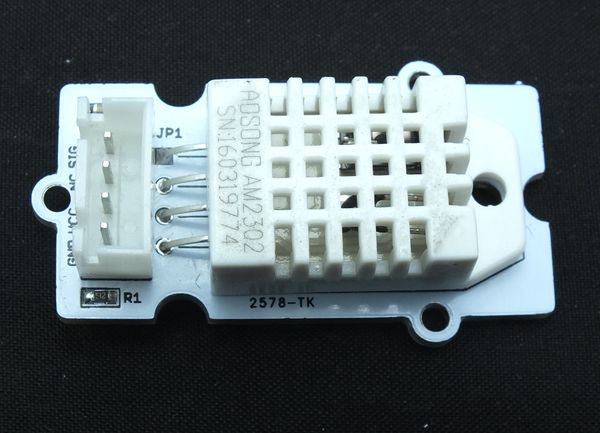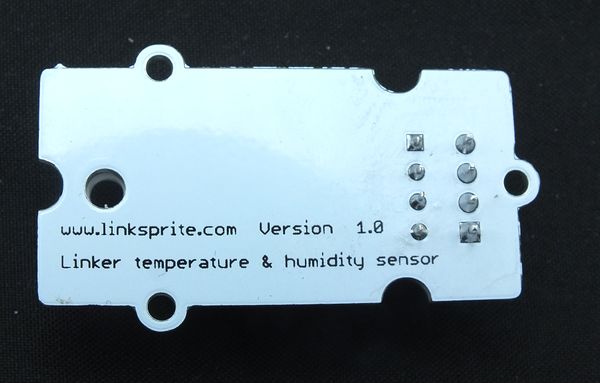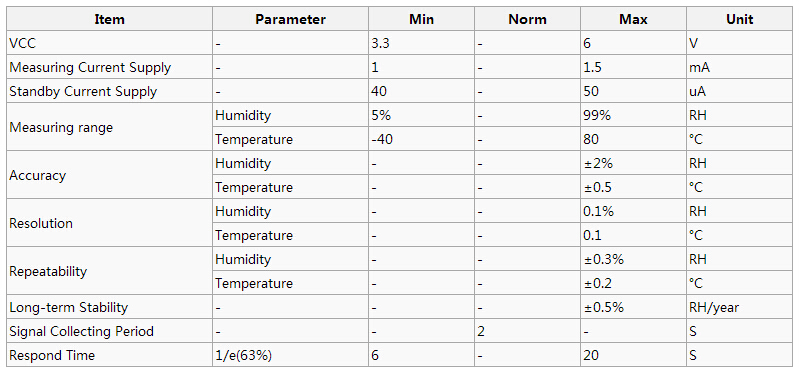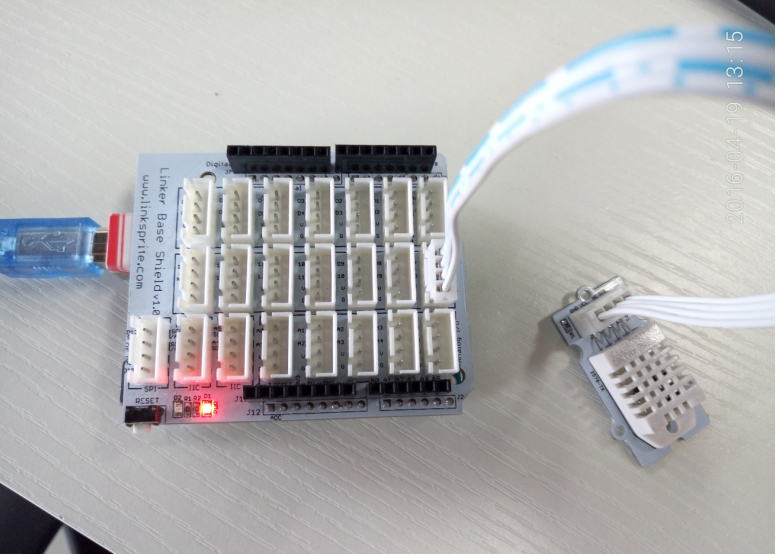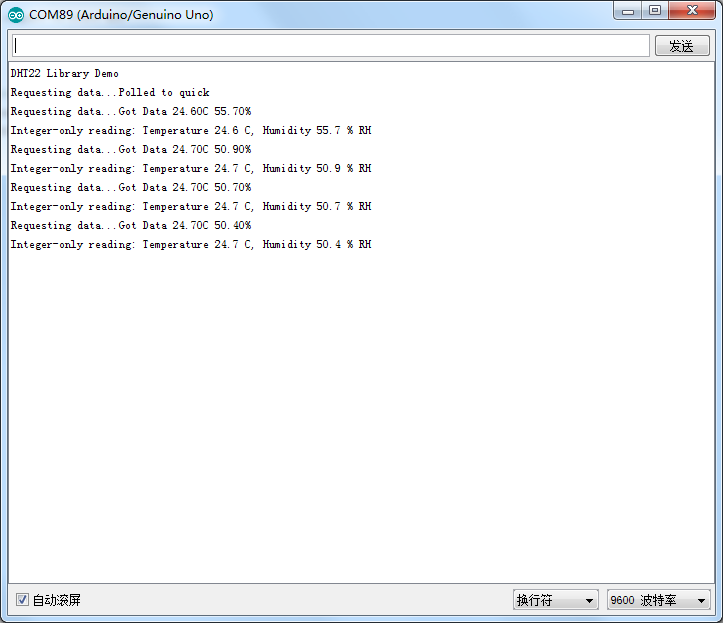Difference between revisions of "Temperature and Humidity Sensor"
(Created page with "== Introduction == This is a powerful sister version of our Linker kit - Temperature and Humidity Sensor. It has more complete and accurate performance. The detecting range o...") |
|||
| (9 intermediate revisions by the same user not shown) | |||
| Line 3: | Line 3: | ||
This is a powerful sister version of our Linker kit - Temperature and Humidity Sensor. It has more complete and accurate performance. The detecting range of this sensor is 5% RH - 99% RH, and -40°C - 80°C. And its accuracy satisfyingly reaches up to 2% RH and 0.5°C. A professional choice for applications that have relatively strict requirements. | This is a powerful sister version of our Linker kit - Temperature and Humidity Sensor. It has more complete and accurate performance. The detecting range of this sensor is 5% RH - 99% RH, and -40°C - 80°C. And its accuracy satisfyingly reaches up to 2% RH and 0.5°C. A professional choice for applications that have relatively strict requirements. | ||
| − | [[File:1-214.jpg]] | + | [[File:1-214.jpg|600px]] |
| − | [[File:1-215.jpg]] | + | [[File:1-215.jpg|600px]] |
| Line 28: | Line 28: | ||
(2)、Program | (2)、Program | ||
| − | + | #include <DHT22.h> | |
| − | + | // Only used for sprintf | |
| − | + | #include <stdio.h> | |
| − | + | // Data wire is plugged into port 7 on the Arduino | |
| − | + | // Connect a 4.7K resistor between VCC and the data pin (strong pullup) | |
| − | + | #define DHT22_PIN 7 | |
| − | + | // Setup a DHT22 instance | |
| − | + | DHT22 myDHT22(DHT22_PIN); | |
| − | + | void setup(void) | |
| − | + | { | |
| − | + | // start serial port | |
| − | + | Serial.begin(9600); | |
| − | + | Serial.println("DHT22 Library Demo"); | |
} | } | ||
| − | + | void loop(void) | |
| − | + | { | |
| − | DHT22_ERROR_t errorCode; | + | DHT22_ERROR_t errorCode; |
| − | + | // The sensor can only be read from every 1-2s, and requires a minimum | |
| − | + | // 2s warm-up after power-on. | |
| − | + | delay(2000); | |
| − | + | Serial.print("Requesting data..."); | |
| − | + | errorCode = myDHT22.readData(); | |
| − | + | switch(errorCode) | |
| − | + | { | |
| − | + | case DHT_ERROR_NONE: | |
| − | + | Serial.print("Got Data "); | |
| − | + | Serial.print(myDHT22.getTemperatureC()); | |
| − | + | Serial.print("C "); | |
| − | + | Serial.print(myDHT22.getHumidity()); | |
| − | + | Serial.println("%"); | |
| − | + | // Alternately, with integer formatting which is clumsier but more compact to store and | |
| − | + | // can be compared reliably for equality: | |
| − | + | // | |
| − | + | char buf[128]; | |
| − | + | sprintf(buf, "Integer-only reading: Temperature %hi.%01hi C, Humidity %i.%01i %% RH", | |
| − | + | myDHT22.getTemperatureCInt()/10, abs(myDHT22.getTemperatureCInt()%10), | |
| − | + | myDHT22.getHumidityInt()/10, myDHT22.getHumidityInt()%10); | |
| − | + | Serial.println(buf); | |
| − | + | break; | |
| − | + | case DHT_ERROR_CHECKSUM: | |
| − | + | Serial.print("check sum error "); | |
| − | + | Serial.print(myDHT22.getTemperatureC()); | |
| − | + | Serial.print("C "); | |
| − | + | Serial.print(myDHT22.getHumidity()); | |
| − | + | Serial.println("%"); | |
| − | + | break; | |
| − | + | case DHT_BUS_HUNG: | |
| − | + | Serial.println("BUS Hung "); | |
| − | + | break; | |
| − | + | case DHT_ERROR_NOT_PRESENT: | |
| − | + | Serial.println("Not Present "); | |
| − | + | break; | |
| − | + | case DHT_ERROR_ACK_TOO_LONG: | |
| − | + | Serial.println("ACK time out "); | |
| − | + | break; | |
| − | + | case DHT_ERROR_SYNC_TIMEOUT: | |
| − | + | Serial.println("Sync Timeout "); | |
| − | + | break; | |
| − | + | case DHT_ERROR_DATA_TIMEOUT: | |
| − | + | Serial.println("Data Timeout "); | |
| − | + | break; | |
| − | + | case DHT_ERROR_TOOQUICK: | |
| − | + | Serial.println("Polled to quick "); | |
| − | + | break; | |
| − | |||
| − | |||
| − | |||
(3)Test Results | (3)Test Results | ||
Latest revision as of 11:25, 19 April 2016
Introduction
This is a powerful sister version of our Linker kit - Temperature and Humidity Sensor. It has more complete and accurate performance. The detecting range of this sensor is 5% RH - 99% RH, and -40°C - 80°C. And its accuracy satisfyingly reaches up to 2% RH and 0.5°C. A professional choice for applications that have relatively strict requirements.
Specification
Platforms Supported
- Arduino
- Raspberry Pi
Test
Test tools and test
(1)Test tools
- Arduino UNO x 1
- Linker Base Shield x 1
- Linker temperature & humidity sensor x1
(2)、Program
#include <DHT22.h>
// Only used for sprintf
#include <stdio.h>
// Data wire is plugged into port 7 on the Arduino
// Connect a 4.7K resistor between VCC and the data pin (strong pullup)
#define DHT22_PIN 7
// Setup a DHT22 instance
DHT22 myDHT22(DHT22_PIN);
void setup(void)
{
// start serial port
Serial.begin(9600);
Serial.println("DHT22 Library Demo");
}
void loop(void)
{
DHT22_ERROR_t errorCode;
// The sensor can only be read from every 1-2s, and requires a minimum
// 2s warm-up after power-on.
delay(2000);
Serial.print("Requesting data...");
errorCode = myDHT22.readData();
switch(errorCode)
{
case DHT_ERROR_NONE:
Serial.print("Got Data ");
Serial.print(myDHT22.getTemperatureC());
Serial.print("C ");
Serial.print(myDHT22.getHumidity());
Serial.println("%");
// Alternately, with integer formatting which is clumsier but more compact to store and
// can be compared reliably for equality:
//
char buf[128];
sprintf(buf, "Integer-only reading: Temperature %hi.%01hi C, Humidity %i.%01i %% RH",
myDHT22.getTemperatureCInt()/10, abs(myDHT22.getTemperatureCInt()%10),
myDHT22.getHumidityInt()/10, myDHT22.getHumidityInt()%10);
Serial.println(buf);
break;
case DHT_ERROR_CHECKSUM:
Serial.print("check sum error ");
Serial.print(myDHT22.getTemperatureC());
Serial.print("C ");
Serial.print(myDHT22.getHumidity());
Serial.println("%");
break;
case DHT_BUS_HUNG:
Serial.println("BUS Hung ");
break;
case DHT_ERROR_NOT_PRESENT:
Serial.println("Not Present ");
break;
case DHT_ERROR_ACK_TOO_LONG:
Serial.println("ACK time out ");
break;
case DHT_ERROR_SYNC_TIMEOUT:
Serial.println("Sync Timeout ");
break;
case DHT_ERROR_DATA_TIMEOUT:
Serial.println("Data Timeout ");
break;
case DHT_ERROR_TOOQUICK:
Serial.println("Polled to quick ");
break;
(3)Test Results
